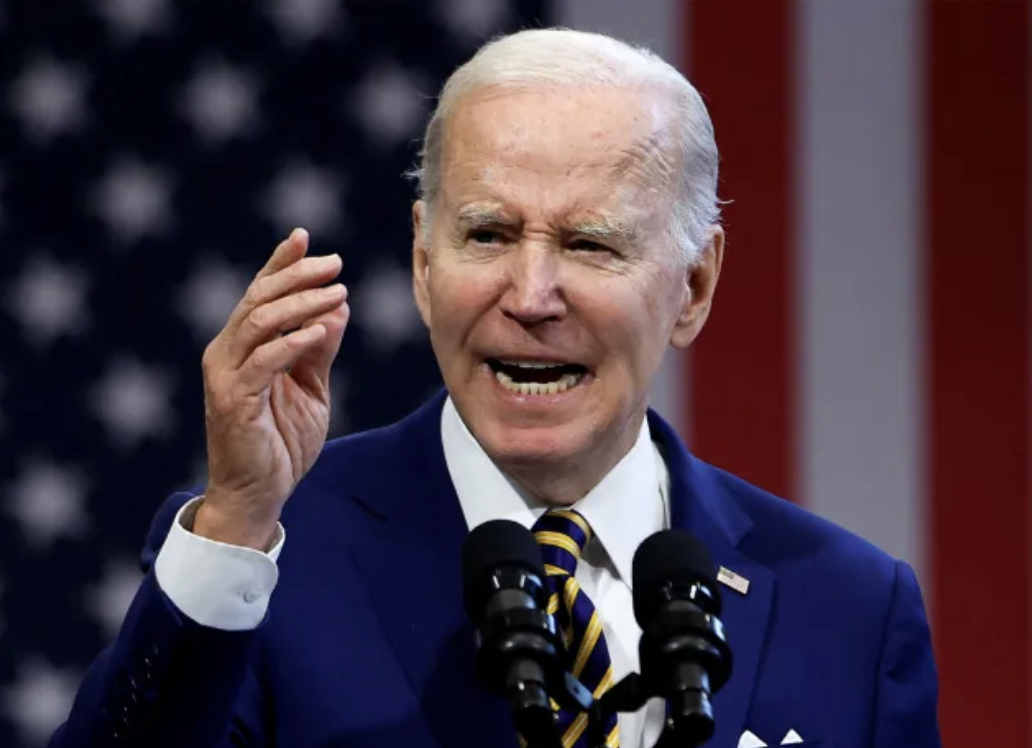By: Noah Rothman – nationalreview.com –
In June, the Biden White House pushed all its chips in on a big gamble. The administration took full ownership of the economic status quo with which most Americans were deeply dissatisfied, branding it a product of “Bidenomics.” The administration assumed that conditions would continue to improve into 2024 to such an extent that Americans who at the time associated Biden with an economy they hated would later give him credit for an economy they liked. So far, the gamble has been a failure.
This week, Politico pronounced a grim, albeit preliminary, sentence on “Bidenomics.” The marketing campaign doesn’t “appear to be working,” the outlet said. One White House official, who was granted anonymity apparently only to gratuitously torture a hockey metaphor, insisted that Democrats are playing “where the puck’s going to be a year from now” whereas Republicans are “skating right around where the puck was yesterday.” Democrats believe declining rates of inflation, diminished fears of a coming recession, and job growth will persist, voters will feel the relief in their wallets, and the public will garland the president and his party in victorious laurels. So far, however, voters remain unconvinced.
The New York Times/Siena survey released on August 1 found that a plurality of registered voters (49 percent) rate present economic conditions as “poor,” while another 29 percent call them “only fair.” Harvard/Harris’s July poll showed that only a bare majority of Democrats (51 percent), 18 percent of independents, and 13 percent of Republicans say the economy is on the “right track.” Forty-seven percent of all registered voters in that survey say their economic conditions are getting “worse,” and just 38 percent approve of the president’s management of economic issues. CNN appeared flabbergasted by the results of its own most recent survey, which found that a majority of Americans believe the economy is bad and getting worse “despite months of increasingly positive economic indicators.”
Voters do not feel the effects of macroeconomic indices. They feel prices, and prices remain high.
The cost of oil is again on the rise — a fact implicitly acknowledged by the White House’s decision to refrain from replenishing the nation’s depleted Strategic Petroleum Reserve until the Department of Energy can “secure a good deal for taxpayers.” The cost of food is high and still growing, a condition exacerbated by Russia’s deliberate efforts to destroy grain stocks in Ukraine and menace the commercial enterprises that would bring the country’s supplies to international markets. But Russia’s war in Ukraine does not by itself explain the nearly 7 percent year-over-year increase in food costs. The high price of labor in the form of rising wages and rising food-production costs (up 4.1 percent so far this year) suffice to explain the pain at the checkout counter. Commodities ranging from new vehicles to clothing to medical care to transportation to shelter costs are higher than they were a year ago, at which point they were already inflated from the pre-pandemic baseline.
For the White House’s bet to “pay off,” Politico submits, “Democrats will have to close the gap that currently exists between the statistics that suggest the economy is strong and the polls that find many Americans don’t agree.” That’s another way of saying that the White House has committed itself to the Herculean task of incepting into voters’ minds the notion that marginal improvements to the economic landscape are the best we can expect. In the process, however, the administration is obliged to emphasize abstractions and modest gains, even at the risk of appearing wildly out of touch with most voters’ economic experience.
The risk that this strategy will backfire on the president is pronounced. Indeed, the finding in CNN’s latest poll that voters now trust Republicans in Congress over their Democratic counterparts to manage the country’s “major issues” by a 54 to 45 percent margin suggests the “Bidenomics” campaign has already failed.
The president’s messaging strategy has made the GOP’s job that much easier, as I wrote in June. The opposition party is often forced to devote a lot of time, attention, and capital to hanging a bad economy around the incumbent president’s neck. Typically, the incumbent would do his best to insist that undesirable economic conditions were inherited from his predecessor or are contingent on factors beyond his control. Instead, the Biden White House has giftwrapped for the GOP a message it would otherwise have had to craft and popularize on its own.
Will the economy improve over the next 14 months? Probably. Will it improve to the point that voters’ impressions of it go from bad to good by the time early voting in the 2024 race begins? That seems less likely.
Good luck, Mr. President.
To see this article in its entirety and to subscribe to others like it, please choose to read more.
 Listen Online
Listen Online Watch Online
Watch Online Find a Station in Your Area
Find a Station in Your Area









 Listen Now
Listen Now Watch Online
Watch Online
